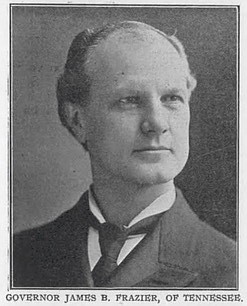(Editor's note: First of two parts)
The Sept. 29, 1904, Chattanooga Daily Times headline announced "Big Parade for Frazier," followed by the report that more than 800 Democrats had marched in company with Gov. James Frazier from his headquarters at the Read House to an auditorium for a public rally.
At 7 p.m., a military band had gathered at the corner of Broad and then-Ninth streets and serenaded the governor with a melody of his favorite patriotic songs. Thirty minutes later, the parade formed and then snaked through the city, "following several of the principal downtown thoroughfares," and the governor had been greeted along the route by hundreds of well-wishers. "The appearance of Governor Frazier was the signal at every point for vociferous applause. To this the governor, in his usual dignified but graceful manner, made acknowledgement by bowing to the right and left." Gov. James Beriah Frazier had arrived home.
Frazier was born in Pikeville, Bledsoe County, and traced his paternal lineage to Samuel Frazier, his great-grandfather, and Abner Frazier, his grandfather, both veterans of the Revolutionary War's Battle of King's Mountain. His middle name honored his uncle, Dr. Beriah Frazier, who had served as one of the earliest Chattanooga mayors. Thomas Frazier, his father, had served as a criminal court judge in Davidson County. Young James had attended Franklin College and then graduated from the University of Tennessee. He was admitted to the bar in 1881, moved to Chattanooga to begin his career and two years later married Louise Douglas Keith. Chattanooga became his home, and Frazier immediately immersed himself in the Chattanooga community, inspired by his family's legacy of service.
Recognized for an outstanding oratory style, his political leadership seemed natural. While Frazier was defeated in his first campaign against the incumbent, 3rd District U.S. Rep. Henry Snodgrass, in 1894, he captured the attention of the Tennessee Democratic Party. By 1900, the party chose him as the state's at-large elector for presidential candidate William Jennings Bryan. Traveling across the state in support of Bryan provided Frazier an opportunity to meet the leadership teams in almost every Tennessee county, creating a network of political allies.
When in 1902 Tennessee Gov. Benton McMillin chose not to seek re-election, James B. Frazier obtained the Democratic nomination, and newspapers across the state predicted his victory. An Oct. 31, 1902, editorial in the Knoxville Sentinel read, "the opposition to Hon. Jas. B. Frazier has really been so slight that The Sentinel has not thought it necessary to say very much about the gubernatorial race. ... The supporters of Mr. Frazier must prepare to go to the polls on Tuesday and vote for a continuance of good democratic state government . ... [He] is not a bitter partisan; he will be governor of all the people ... And he will make one of the best chief executives the state has had."
The Columbia Herald and Mail only days earlier had reported his visit to Maury County: "the house being well filled and his speech waked them from their lethargy. It was a magnificent speech. Bold and fearless, yet moderate and unoffending. Eloquent, logical and splendidly delivered." The Nashville Tennessean headlined "Frazier May Set a Record," tracking his trip through East Tennessee -- "one continual ovation" -- into Middle Tennessee with the note that "Mr. Frazier will come over the mountains with the handsomest vote in many years ... there was never a man who was more universally honored and admired by the members of both of the great parties than is Mr. Frazier. The manner in which Mr. Frazier is being received ... is equal to the ovation given him in East Tennessee." From Union City where the Commercial Courier noted that the "Honorable Jas. B. Frazier Delivered One of the Best Talks Ever Heard in Obion County" to the Clarksville Leaf-Chronicle, which proclaimed, following a debate between the gubernatorial candidates, that "Mr. Frazier was easily the master in the argument and carried the house away with his brilliant answer to the speech of his opponent ... received with an outburst of applause and was frequently interrupted by prolonged cheering."
When the general election votes were counted, Frazier had won with 98,902 votes to 59,007 for Republican Judge H. Tyler Campbell and 2,193 votes for R.S. Cheves, the Prohibition candidate.
Linda Moss Mines, Chattanooga and Hamilton County historian, is vice chair of the National Medal of Honor Heritage Center and honorary regent, Chief John Ross Chapter, NSDAR. Visit chattahistoricalassoc.org for more information.
